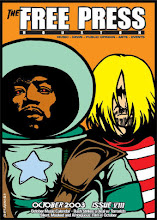Trouble the Water
Tia Lessin and Carl Deal thought they were making a documentary about National Guard soldiers from Louisiana who were in Baghdad when Hurricane Katrina struck dry land. "The high water vehicles the National Guard would need for the disaster were in Iraq," Lessing told Free Press Houston in an interview conducted on the patio outside the Angelika Film Center. Trouble the Water, the resulting film, is currently playing in an exclusive engagement at the Angelika.
Literally out of the blue walked Kim and Scott Roberts into their lives and the documentary. Kim and Scott were leading a caravan of New Orleans survivors, saw the camera crew at a convention center in the middle of Louisiana, and walked up saying they had shot video of the real thing, Fifteen minutes of dramatic hurricane footage in addition to the aftermath filmed by Lessin and Deal as they try to make sense of the disaster, make Trouble the Water compelling viewing.
Kim knew the hurricane was coming, she and Scott couldn't afford to leave town so she started video taping her neighborhood, New Orlean's 9th Ward that was ground zero when the levees broke. What she captured shows the human tragedy at the heart of the disaster. An uncle passed out on front porch from booze steps will be dead in hours, dry streets swept with wind will turn into raging rivers. When Kim's video reveals the family huddling in the attic because the water has risen so high the resulting claustrophobia is like a scene out of a George Romero film. Only in Trouble the Water, it's real. A 911 emergency call comes over the soundtrack. A woman says she's trapped in the attic and is going to drown. The operator can only inform the caller that the police are not responding at this point in the storm. "I'm going to die?" the caller asks. "Yes," comes the automatic reply.
"There were a lot more call like that," Lessin mentions, "You wouldn't believe how many."
The footage Kim shot forms the basis of the film but substantial info is gleamed by Lessin and Deal as they follow-up on the people we meet at the beginning. Kim also has a hip hop project called Black Kold Madina that comes to fore in the latter part of Trouble the Water. Kim has some moves and knows how to use the camera. All the while you're flashing back to the footage of the storm. Moments like Larry, a neighbor who swims back and forth rescuing people from Kim's attic to higher ground. "There were about a dozen people in the attic," Lessin reminds.
Trouble the Water shows more than the 9th Ward, during and after Katrina. Segments set at a Naval Base that turned survivors of the flood away at gunpoint and the New Orleans Chamber of Commerce with their feel-good hometown promotion bring home the fact that some people perceive the whole affair in a totally different light.











